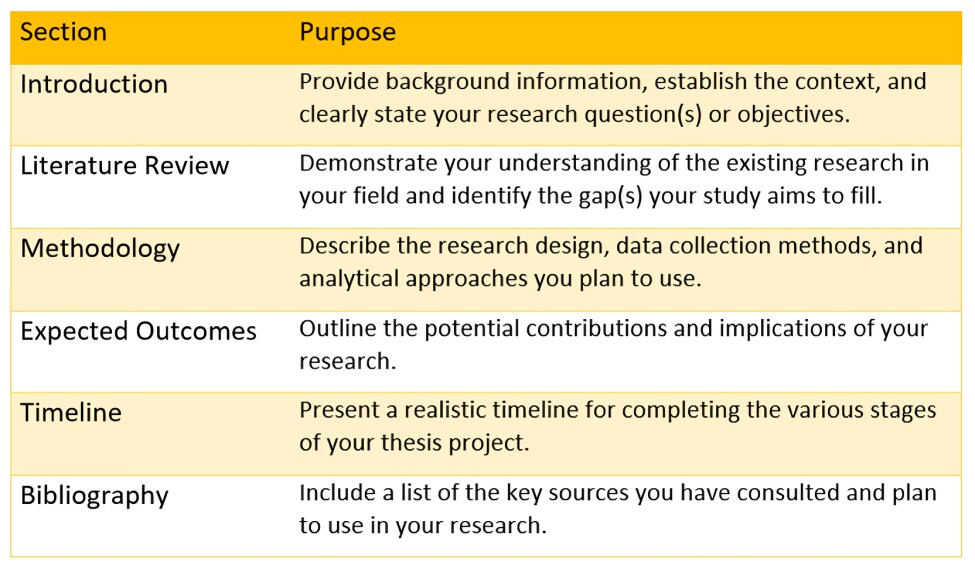Crafting a Compelling Thesis Proposal


A typical thesis proposal consists of several key components, each serving a specific purpose. Table 1 outlines the primary sections you should include in your proposal:

The introduction is your opportunity to hook the reader and clearly articulate the significance of your proposed research. Consider the following tips:
Start with a strong hook: Begin with a compelling statement, statistic, or relevant quote that captures the reader's attention.
Provide background information: Contextualize your research by briefly discussing the broader field, relevant literature, and any existing gaps or unanswered questions.
State your research question(s) or objectives: Clearly define the central question(s) you aim to address or the specific objectives you intend to achieve through your study.
Highlight the significance: Explain why your research is crucial and how it will contribute to the field or have a real-world impact.

The literature review is your chance to demonstrate your deep understanding of the existing research and to position your study within the broader academic landscape. Here are some tips for an effective literature review:
Organize your review thematically: Group relevant studies into coherent themes or topics to help the reader follow the narrative.
Critically analyze the literature: Don't just summarize the sources; evaluate the strengths, weaknesses, and gaps in the existing research.
Identify the gap(s): Clearly articulate the specific gap(s) in the literature that your proposed study aims to address.
Justify your approach: Explain how your research design and methodological choices are well-suited to fill the identified gap(s).

The methodology section is where you demonstrate the feasibility and rigor of your proposed research approach. Consider the following elements:
Research design: Describe the overall research design, such as qualitative, quantitative, or mixed methods.
Data collection: Outline the specific data collection methods you plan to use, such as interviews, surveys, or experiments.
Data analysis: Explain how you will analyze the collected data, including any statistical techniques or qualitative coding procedures.
Ethical considerations: Address any potential ethical concerns and how you will mitigate them.

In this section, you should highlight the anticipated contributions and real-world implications of your research. Address the following:
Potential contributions: Explain how your study will advance the current understanding in your field or address a pressing societal issue.
Practical applications: Discuss how the findings of your research could be applied or implemented in the real world.
Limitations and future research: Acknowledge the potential limitations of your study and suggest avenues for future research.

SITA Academy is a comprehensive service provider dedicated to supporting students, researchers, and authors in their academic and writing endeavors. With a team of experienced professionals, we offer a wide range of services to help you achieve your goals.

At SITA Academy, we offer comprehensive support to help you craft a winning thesis proposal:
Formatting in APA, MLA, and other styles
Native English editing and proofreading
Partner with us and let us handle the details, so you can focus on your research and achieve the academic success you deserve. Contact us today to get started!
If you have any questions, inquiries, or would like to learn more about our services, please don't hesitate to reach out to us. Our dedicated team is ready to assist you.